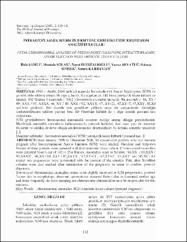İntrastoplasmik sperm injeksiyonu gebeliklerde kromozom analizi bulgular
Özet
Ocak 1996 - Aralık 2000 tarihleri arasında İntrastoplasmik Sperm Injeksiyonu (ICSI) ile gebelik elde edilmiş ardışık 98 olgu çalışıldı. Bu olgulara ait 142 fetus amniyotik hücre kültürü ile tarandı. 142 fetusun 6 tanesinde ( %4,2 ) kromozom anomalisi saptandı. Bu anomaliler 46, XX / 69, XXX / 92, XXXX, 46, XY / 69, XXY / 92, XXYY, 47, XY+21, 47,XY+7, 47,XXY, 45,X0 şeklinde gözlendi. Biri dışında tüm gebelikler çiftlerin onayı ile soıılandırıldı. Gebeliğin sonlandırılmasını takiben yapılan fetal cilt fibroblast kültürü ile 1 olgu dışında prenatal tanı doğrulandı.
ICSI gebeliklerinde kromozomal düzensizlik oranının hafifçe artmış olduğu görülmektedir. Morfolojik anomalili spermlerin kullanılmasıyla paternal faktörler, ileri anne yaşı ile maternal faktörler ve sıklıkla de novo oluşan sex kromozomal düzensizlikler bu konuda sorumlu tutulabilir. From January 1996 to December 2000, 98 consecutive patients who had become pregnant after Intracytoplasmic Sperm Injection (ICSI) were studied. Hundred and forty-two fetuses of these patients were screened with fetal amniotic tissue culture. Chromosomal anomalies were detected from 6 out of 142 (4.2%) fetuses. Anomalies were as follows, ‘46,XX / 69,XXX / 92,XXXX’, ‘46,XY / 69, XXY / 92,XXYY’, ‘47,XY+21’, ‘47,XY+7’, ‘47,XXY’ and ‘45,X0’. All except one pregnancies were terminated with the consent of the couples. Fetal skin fibroblast cultures were also studied after termination of the pregnancy in order to confirm prenatal diagnosis. The ratio of chromosomal anomalies seems to be slightly increased in ICSI pregnancies, paternal factors due to morphology abnormal spermatozoa maternal factors due to increased mother age and more frequently, de novo occuring sex chromosome abnormalities may be responsable for this outcome.
Kaynak
Afyon Kocatepe Üniversitesi, Kocatepe Tıp DergisiCilt
3Sayı
2Bağlantı
http://hdl.handle.net/11630/1649Koleksiyonlar
- Makaleler [452]



















